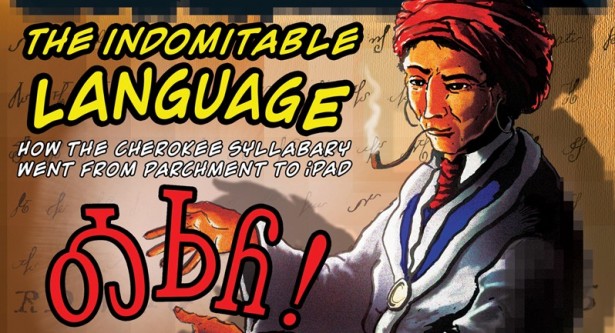Sequoyah's syllabary, from parchment to iPad
« previous post | next post »
In a great use of comic art, Roy Boney Jr. has created a graphic feature for the magazine Indian Country Today about the history of the Cherokee syllabary developed by Sequoyah in the early 19th century. Boney begins with the syllabary's inception and early use, and continues all the way through technological developments like the Selectric typewriter and Unicode standardization. Check it out here.

jan said,
September 21, 2011 @ 1:40 pm
Who will play Sequoyah in the Hollywood adaptation? Can we persuade Sherman Alexie to write the script?
Dylan said,
September 21, 2011 @ 2:38 pm
Very very cool stuff.
Cameron Majidi said,
September 21, 2011 @ 4:06 pm
It's somewhat strange to me that the really miraculous part of the story is skipped, with a passing mention in the form of "after a rocky start and years of work and revisions".
Tracy said,
September 22, 2011 @ 12:19 pm
Impressive.
The story seems to imply that there is more being written in Cherokee today than a casual web search suggests is true. This is the case with a lot of languages that everybody agrees should be kept vital, but that require work to keep alive, I guess? I'm glad the comic is really clear on the point that keeping up with new media can make a huge difference — if teenagers don't text in it, that seems like a pretty dire sign for any language, to me.
On the plus side, there _are_ a bunch of articles in the Cherokee version of Wikipedia.
Joe said,
September 22, 2011 @ 2:02 pm
How cool is this? The late great Johnny Cash sang about it, with the Carter family backing him up: http://www.youtube.com/watch?v=wLsE5JeAnL0.
Svafa said,
September 22, 2011 @ 2:20 pm
@Tracy: Here's to hoping there is a great deal more being written in Cherokee than might be apparent to a casual web search. I recently started researching the language and finding good online resources has been difficult. Thankfully, I live near the Eastern Band, so local libraries and book shops are helpful, but with what I've found to be such an intriguing language, I'd hate to see it strangled by that insidious English.
p.s. Before I'm misunderstood, I adore English and any jabs made against her are done with the greatest affection.